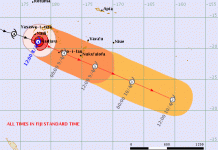Four Tongatapu men who charged with assaulting a soldier in September last year have been convicted on charges the Supreme Court found them guilty on.
In his ruling, Justice Laki Niu said Walter Fangatua was guilty of the charge of serious causing bodily harm brought against him and he convicted him of that offence.
The alternative charge of assault against him was dismissed.
Mr Niu said Lisiate Fonua was guilty of the charge of assault against him and he has convicted him of that offence. The alternative charge of serious causing bodily harm brought against him was dismissed.
Siope Niusini was found guilty of the charge of assault brought against him and Mr Niu convicted him of that offence.
The three accused have been tried together in a joint trial after they assaulted Lehopoame Tu’utafaiva.
A fourth accused, Semisi Tu’ineau, has already pleaded guilty to one charge of assault in respect of the same person in the same incident.
Fangatua struck Tu’utafaiva repeatedly with a hoe blade, and alternatively, assaulting him by striking him with a hoe blade.
Fonua struck Tu’utafaiva with a hoe blade and injuring his head, and alternatively assaulting him by punching and kicking him repeatedly.
Niusini was charged with assaulting Tu’ufaiva by punching and kicking him repeatedly.
The court was told Tu’utafaiva was in the Tongan army and he and some of his army friends were having a few drinks at the home of an army couple friend in Havelu.
Late at night, two boys came into their drinking, namely Fonua and Niusini. The court was told that as the two accused were leaving, they threw a piece of brick which hit the bonnet of the vehicle which was parked at the front of the house.
Tu’utafaiva and another soldier chased after them followed by some other five soldiers and three women from their party. The two boys escaped.
As they were walking back, a motor vehicle came up and stopped and boys got out of it and fought with them. Tu’utafaiva told the court he was hit on the head by someone from behind with a pipe and he fell down and he was then kicked and punched whilst he was down.
Tu’utafaiva said he did not know who hit him or who kicked and punched him on the ground (the road) but that he received two cuts to the back of his head, one of which measured 2 centimetres long and 1centimetre deep and it was stitched at the hospital that same night. He said he also had a split lip. The cut to the head bled profusely.
In cross-examination Lawyer Sunia Fili, who acted for Fangatua, said Tu’utafaiva admitted that he had shouted out to the people at the home of Teivi, “We are soldiers, come and fight”, and by Atalasa Pouvalu who acted for Niusini said Tu’utafaiva admitted that both groups of boys had consented to fight each other.
Mr Niu did not accept Fangatua’s self defence claim and that there was consent to be assaulted.
Mr Niu Said: “As I have stated, such fight was unlawful and any punch or kick thrown by any of the fighters was unlawful, and it cannot be justified by the fact that the person complaining had consented to fight in a fight in which the punch or kick was delivered.”
Mr Niu also said that having “considered the law and the evidence as I have stated above, I am satisfied beyond reasonable doubt that” the trio had committed the offences.







